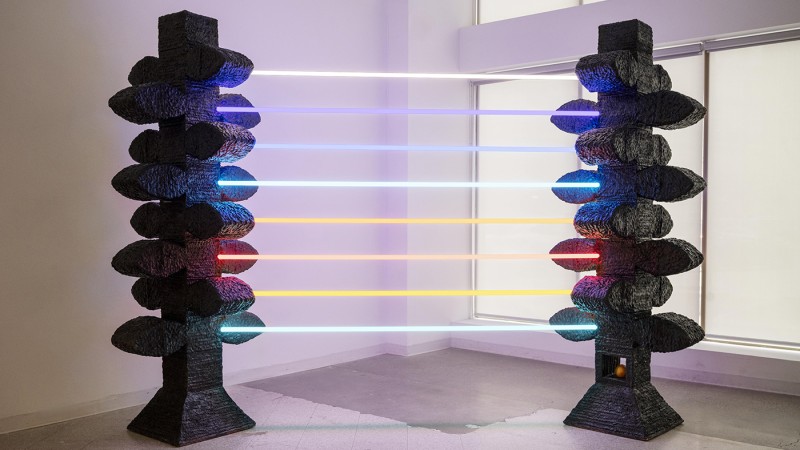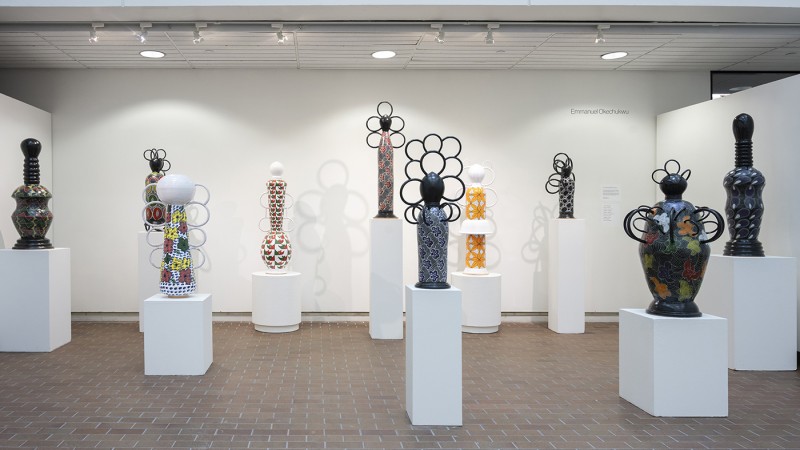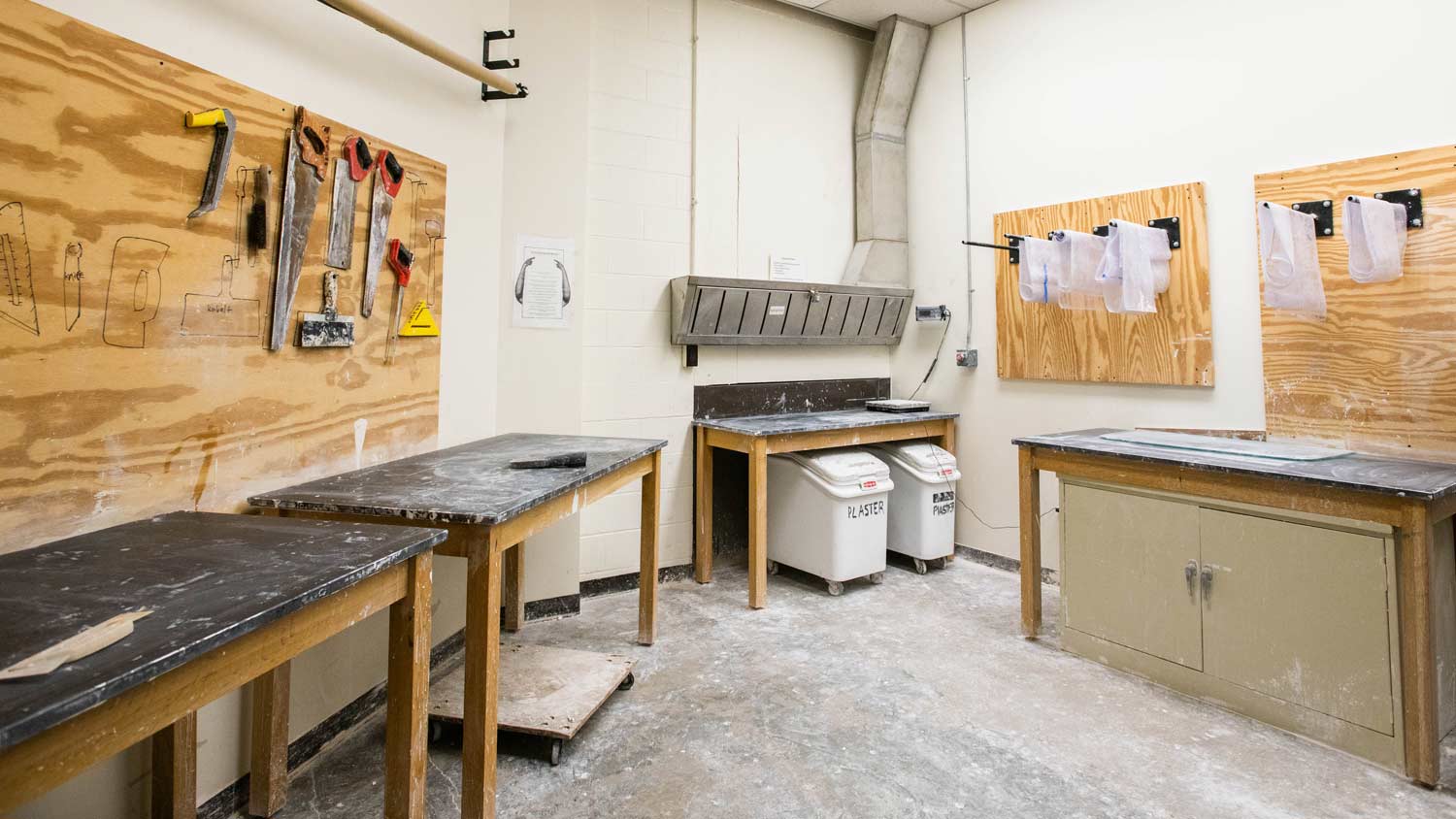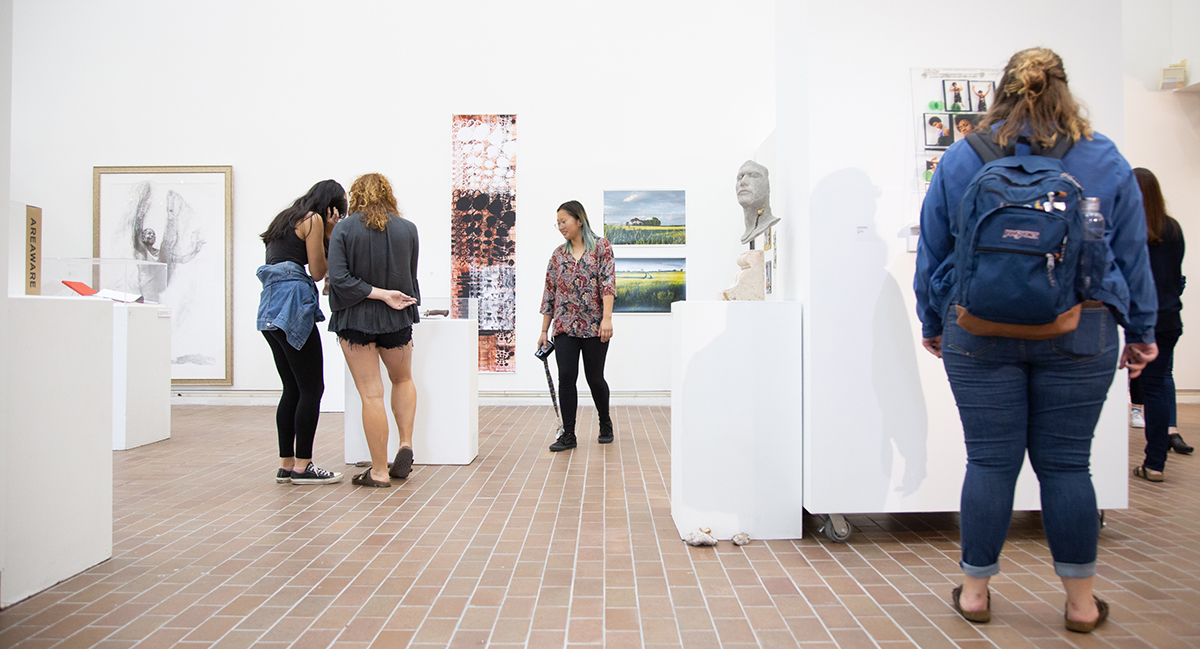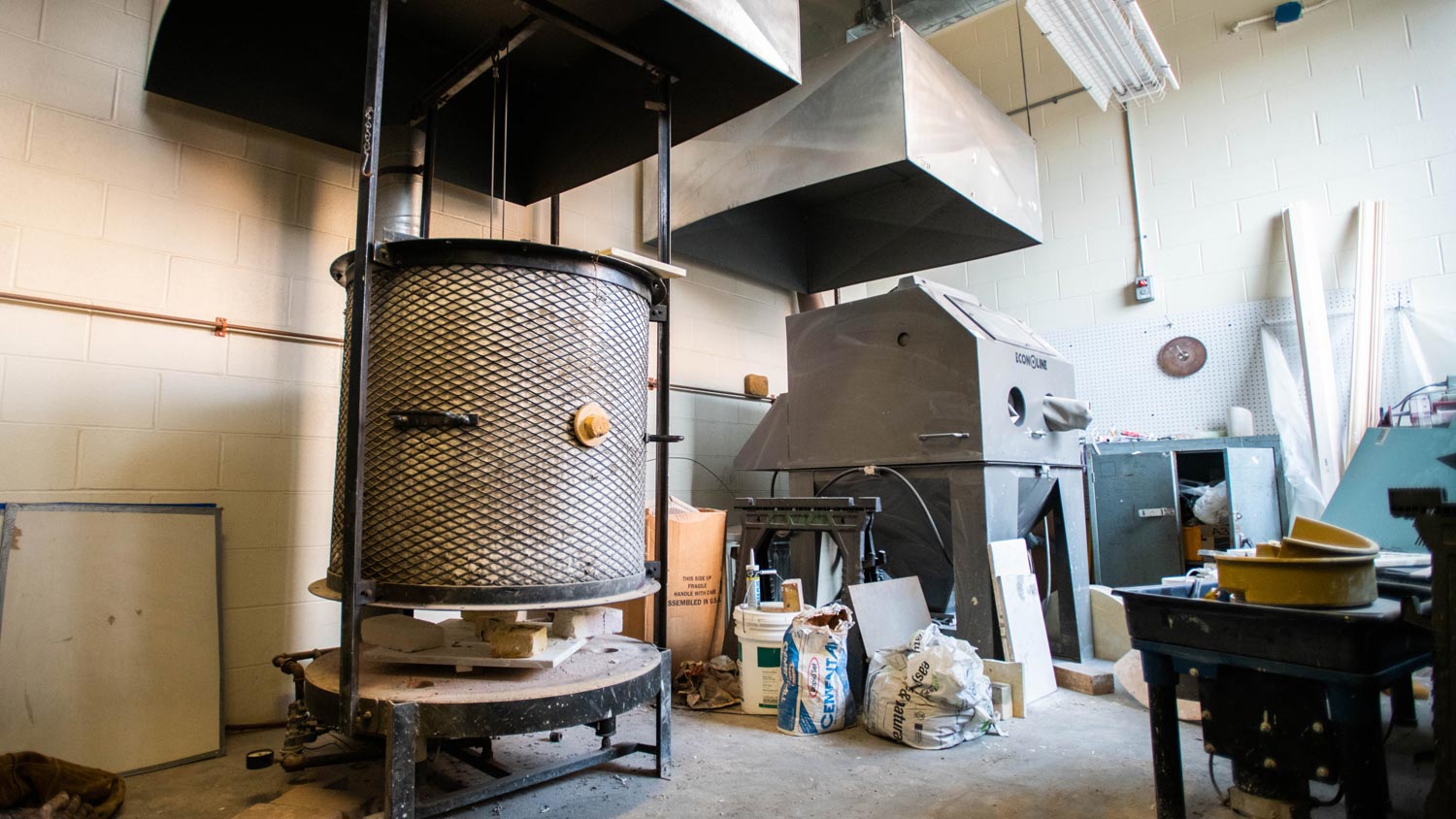Ceramics Master of Fine Arts Degree
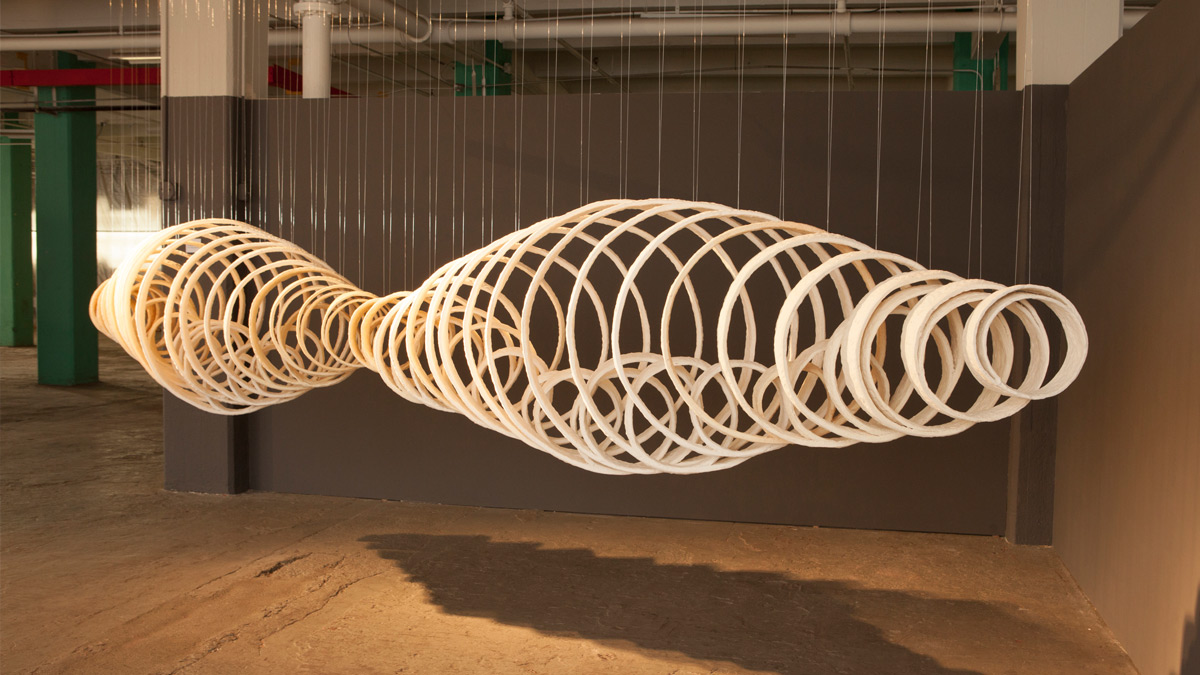
Ceramics
Master of Fine Arts Degree
- RIT /
- College of Art and Design /
- Academics /
- Ceramics MFA
Overview for Ceramics MFA
Why Study Ceramics at RIT
Intellectual and Artistic Development: Explore historical and contemporary ceramics, expanding both your scholarly and artistic thinking.
Deep Understanding of Craft: Delve into techniques within ceramics while receiving in-depth critiques, enhancing personal expression and artistic voice.
Thesis Progress Tracking: Participate in a structured thesis planning and implementation process, culminating in a formal critique and evaluation by a thesis committee.
Studio Residency Opportunity: Gain hands-on experience through the Studio Residency Program, offering workspace, facilities access, and supportive instruction for aspiring ceramicists.
The MFA in ceramics develops your intellectual and artistic thinking through an extensive curriculum. You will rigorously examine the work of historical and contemporary artists and craftspeople as you expand your knowledge of the techniques within the ceramics field. In-depth critiques give you a deep understanding of your own work as well as your peers to enhance your artistic expression and personal voice. Earning your degree in ceramics will deepen your understanding of aesthetics, forming processes, and fine art theory as it further enhances your career in ceramics.
What is Ceramics?
Ceramics is an artistic craft in which objects from earthenware, stoneware, and porcelain (including pottery, vases, bowls, sculptures, tiles, and more) are created and shapes using a mixture of clay, silica, feldspar and other materials. Once an object has been created, it is fired in a kiln, or a high temperature oven. Afterwards, may ceramic objects are then decorated with paints, glazes, and other finishing materials.
MFA in Ceramics
RIT's MFA in ceramics focuses on artistic development through an intensive teaching of the aesthetics and techniques of ceramic design. Graduate studio courses, seminar courses, and in-depth critiques, in conjunction with thesis planning and implementation, provide students with a deep understanding of not only their own work but the work of other students and their peers. Students examine the creativity, perceptions, aesthetics, and criticism of the work of contemporary artists and craftspeople in courses and discussions. Thesis reviews track students' progress towards the final thesis presentation, which is completed when a formal critique and evaluation is performed by the thesis committee.
Studio Residency Program
The School for American Crafts offers a Studio Residency Program for students in ceramics, furniture design, glass, and metals and jewelry design. Residence positions are limited and are awarded after the review of all applicants’ portfolios, transcripts, and references. An interview is required. Accepted residents are required to register for one independent study credit during each semester of residence.
Accepted residents are expected to be present in their assigned studio during class hours and to contribute up to 10 hours of work per week in the main studio. These work hours are coordinated and overseen by the faculty in the resident's discipline. In exchange, the school will provide workspace, access to facilities, and supportive instruction. The resident is invited to participate in the full range of studio activities.
Participants may be those seeking additional studio experience prior to undergraduate or graduate study, early career professionals, or teachers on leave who wish to work again in an academic studio environment. The faculty in each discipline will make decisions concerning appropriate candidates.
Inquiries should be made to the Studio Residency Program, School for American Crafts, College of Art and Design, Rochester Institute of Technology, 73 Lomb Memorial Drive, Rochester, NY 14623-5603.
-
Affordable Now. Valuable for Life.
Earn your master’s degree without the full price tag. With Master Up you can receive a 30% tuition scholarship for an RIT master’s degree.
-
Apply early for priority consideration for admission and financial aid.
Applications are accepted after the deadline, but are only considered on a space-available basis.
-
Meet us on-campus on February 19
Learn about the programs that interest you. Hear from program faculty, speak with current graduate students, and ask the questions that will help you get one step closer to your career goals.
Careers and Experiential Learning
Typical Job Titles
| Craft Artist | Artist-in-Residence | Sculptor |
| Studio Technician |
Cooperative Education and Internships
What makes an RIT education exceptional? It’s the ability to complete relevant, hands-on career experience. At the graduate level, and paired with an advanced degree, cooperative education and internships give you the unparalleled credentials that truly set you apart. Learn more about graduate co-op and how it provides you with the career experience employers look for in their next top hires.
Co-ops and internships take your knowledge and turn it into know-how. Your art and design co-ops will provide hands-on experience that enables you to apply your artistic capabilities in dynamic professional settings while you make valuable connections between classwork and real-world applications.
Cooperative education, internships, and other experiential learning opportunities are strongly encouraged for graduate students in the MFA in ceramics.
Featured Work and Profiles
-
Exhibition Opportunities in Downtown Rochester
John Aasp, Todd Jokl RIT has maintained a creative presence in downtown Rochester with an urban art gallery in various locations since 1999. The latest location of RIT City Art Space in the Neighborhood of Play, steps...
Read More about Exhibition Opportunities in Downtown Rochester -
Functional pottery with a New York State twist
Jane Shellenbarger Growing up in New York State informs the work of Andy Foster ’25 MFA (ceramics), whose functional pottery honors the state’s centuries-old tradition of stoneware production.
Read More about Functional pottery with a New York State twist -
Carving a path as an artist, curator, and teacher
Jane Shellenbarger Alex Paat’s ’25 MFA (ceramics) experience at RIT was filled with artistic, curatorial, and instructional exploration.
Read More about Carving a path as an artist, curator, and teacher -
Sharing Nigerian stories through ceramic sculpture
Jane Shellenbarger Emmanuel Okechukwu ’25 MFA (ceramics) spent his time at RIT developing a signature style that distinguished his work from other potters.
Read More about Sharing Nigerian stories through ceramic sculpture -
Alumni Spotlight: Tarrant Clements
Potter. Painter. Printmaker. Sculptor. Tarrant Clements '68 MFA (ceramics) has worked in a variety of mediums throughout her successful career.
Read More about Alumni Spotlight: Tarrant Clements -
Embracing creativity and exploration
Alex Lobos, Gregory Halpern, Elizabeth Kronfield, Todd Jokl The College of Art and Design at RIT offers distinctive graduate degrees that combine the best of art, design, creativity and technology. Our diverse portfolio of graduate program offerings includes...
Read More about Embracing creativity and exploration
Curriculum for 2025-2026 for Ceramics MFA
Current Students: See Curriculum Requirements
Admissions and Financial Aid
This program is available on-campus only.
| Offered | Admit Term(s) | Application Deadline | STEM Designated |
|---|---|---|---|
| Full‑time | Fall | February 1 priority deadline, rolling thereafter | No |
| Part‑time | Fall | Rolling | No |
Full-time study is 9+ semester credit hours. Part-time study is 1‑8 semester credit hours. International students requiring a visa to study at the RIT Rochester campus must study full‑time.
Application Details
To be considered for admission to the Ceramics MFA program, candidates must fulfill the following requirements:
- Complete an online graduate application.
- Submit copies of official transcript(s) (in English) of all previously completed undergraduate and graduate course work, including any transfer credit earned.
- Hold a baccalaureate degree (or US equivalent) from an accredited university or college. A minimum cumulative GPA of 3.0 (or equivalent) is recommended.
- Submit a current resume or curriculum vitae.
- Submit a personal statement of educational objectives.
- Submit two letters of recommendation.
- Entrance exam requirements: None
- Submit a portfolio. View portfolio requirements.
- Submit English language test scores (TOEFL, IELTS, PTE Academic, etc.), if required. Details are below.
English Language Test Scores
International applicants whose native language is not English must submit one of the following official English language test scores. Some international applicants may be considered for an English test requirement waiver.
Duolingo (DET): 120
IELTS: 6.5
LanguageCert Academic: 70
PTE Academic: 56
TOEFL: 79
International students below the minimum requirement may be considered for conditional admission. Deaf and hard-of-hearing test takers with significant hearing loss do not need to take the listening and speaking sections for the TOEFL and IELTS. Each program requires balanced sub-scores when determining an applicant’s need for additional English language courses.
How to Apply Start or Manage Your Application
Cost and Financial Aid
An RIT graduate degree is an investment with lifelong returns. Graduate tuition varies by degree, the number of credits taken per semester, and delivery method. View the general cost of attendance or estimate the cost of your graduate degree.
A combination of sources can help fund your graduate degree. Learn how to fund your degree
Crafts Scholarships
Students applying to the MFA programs in ceramics, glass, furniture design, and metals and jewelry design may apply for a competitive, full-tuition scholarship. Learn more about the crafts scholarships, including eligibility, application requirements, and deadlines to apply.
Accreditation
Related News
-
September 24, 2025

New School of Film and Animation director, faculty roles for 2025-26
Ricky Figueora taking over as the new director of RIT's School of Film and Animation headlines exciting promotions and additions to the College of Art and Design faculty.
-
May 2, 2025

RIT casts a bright light at national iron arts conference
Between a moving performance, building an award-winning iron-melting device, and featured exhibitions, RIT students, faculty, staff and alumni were present in every corner of the National Conference on Contemporary Cast Iron Art and Practices.
-
April 30, 2025

Ceramics MFA candidate from Nigeria finds his signature at RIT
From textiles to clay, Emmanuel Okechukwu’s journey at RIT was marked by an ambition to find a storytelling style with his ceramics that authentically shared his Nigerian lineage.
Contact
- Bethany Iraci-McBane
- Assistant Director, Graduate Admissions
- Office of Graduate Admissions
- Enrollment Management
- 585‑475‑5235
- bimges@rit.edu

- Jane Shellenbarger
- Ann Mowris Mulligan Endowed Professor
- School of Art
- College of Art and Design
- sac@rit.edu
School for American Crafts









